Japan engineered an armed powered exoskeleton “Infinite Stratos” (IS) and it became the mainstream of weapons. Since only women can operate IS, women dominate the society over men. Orimura Ichika is a 15 year old boy and accidentally touches an IS placed in the IS pilot training school. He is found to be the only man who can operate IS and forced to enter the training school. Ichika’s busy school life surrounded by girls has begun.
This series has been sitting untouched in my library since I expressed an interest in watching it back during Summer 2011: I was mostly interested in seeing mecha battles, but I suppose that the fact that “only women can operate IS” gave away the premise. While being somewhat similar to Strike Witches in concept, the fact that the protagonist, Ichika, can wield the equivalent of a Striker unit, changes up the dynamics and sends the story in a predictable direction. Moreover, the fact that the developement of the IS resulted in peace removes any conventional means of conflict: with no disputes between international powers and no politics, the IS act as a catalyst for yet another anime about courtship; only this time, there are no elections involved.
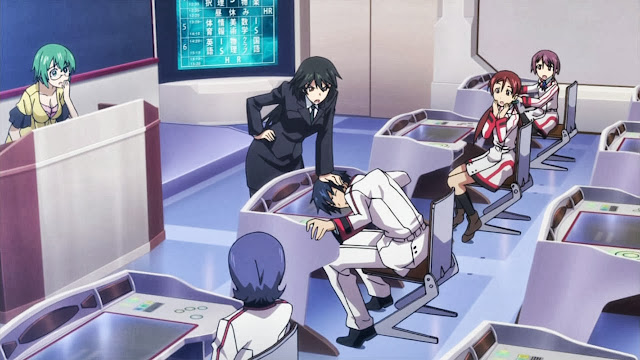
- I’m a little late to the party: it’s been two years since Infinite Stratos was released, and it was only the announcement of a second season that got my interest. Infinite Stratos doesn’t particularly make sense, but then again, neither does a lot of fiction.

- Mio Akiyama (left) and Banagher Links (right) share a conversation here. A lot of well-known voice actors, including Hikasa Youko (Houki), Yukana Nogami (Cecelia), Shimoda Asami (Rin), Hanazawa Kana (Charlotte), Inoue Marina (Laura), and Uchiyama Kouki (Ichika). Of note is the fact that Ichika and Gundam Unicorn‘s Banagher Links share the same voice actor, thereby giving me a chance to crack jokes about K-On! and Gundam Unicorn.
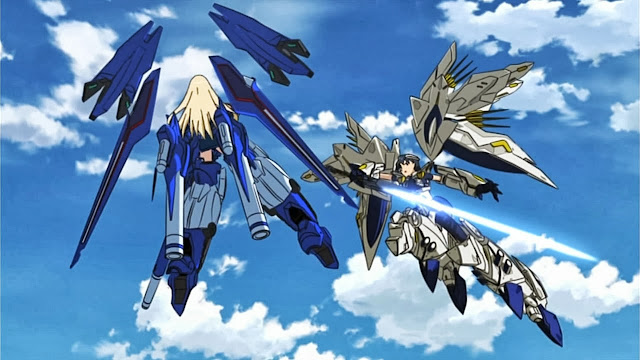
- The IS are powered exoskeletons which possess advanced technology and combat capabilities. Originally designed for outer space exploration, it has now become the new mainstream weapon of the world. The IS are further divided into training and personal units, the latter of which can change to fit with the user’s specifications. Originally harder to use in their default settings but once formatted to their users, they become like an extension of the users themselves. Personal IS units’ abilities far surpass those of the Training IS units, boasting greater output in firepower, speed and maneuverability, etc. Personal IS units are currently divided into four generations, with each generation surpassing the previous in terms of overall specifications.

- Even early on in the anime, it becomes apparent that the IS are not actually the core of the show: Infinite Stratos can thus be seen as a romance comedy. Here, Houki and Cecelia clash over Ichika: the girls’ in-fighting is presented in a comedic manner.
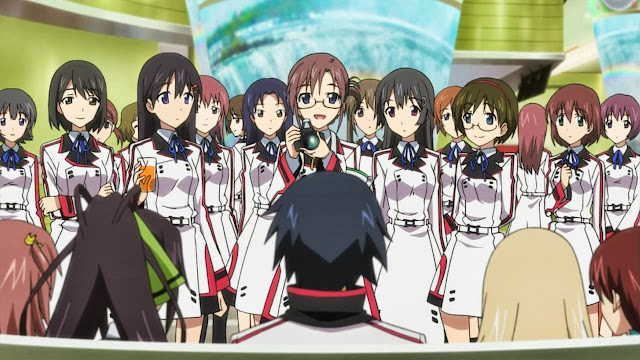
- The essential skills I learnt from high school include fundamentals of biology, physics and chemistry, introductory calculus methods and constructing coherent papers. I argue that a school that does not give instruction on these things, as evidenced by the IS Academy, puts its students at a severe disadvantage.

- Houki Shinonono is Ichika Orimura’s childhood friend; though they have not seen each other for six years, she still harbors strong feelings for Ichika and tends to get jealous when other girls are around him.

- I’ve already introduced Houki (left), so here are two other contenders: Huang Lingyin (middle) is known as Rin and is an IS Cadet Representative of China. Having known Ichika since childhood, and fell in love with him ever since he protected her against four school bullies. Cecilia Alcott (right) is first year student at the IS Academy and is an IS Cadet Representative of the United Kingdom. She views Ichika as a true man and falls in love with him after she was nearly defeated by Ichika for the position of class representative.

- Charlotte is a first year student at the IS Academy and is an IS Cadet Representative of France. Charlotte initially calls herself Charles Dunois ,posing as the second “male” IS pilot student to discover how Ichika is able to pilot an IS and acquire data from his IS. Upon learning that Charlotte’s father and his corporation used her to spy on him, Ichika decides to help protect her. She later falls in love with Ichika due to his bravery.

- Laura is a genetically-engineered super-soldier and an IS Cadet Representative of Germany. Upon learning Ichika’s strength is his freedom to choose and helping those around him and Chifuyu’s advice, Laura decides to become Ichika’s bodyguard to protect him against the other girls by kissing him in front of his class and professes that he is her wife, a misunderstanding of her knowledge of Japanese culture, and she will not accept any objections.

- The fact that all of the girls going for Ichika’s heart have a personal IS, bringing to mind the whole notion that elite, special forces units are more glamorous relative to their standard counterparts and therefore more interesting to watch. This is not dissimilar to current trends in FPS gaming, where players are put in the role of a spec ops unit.
Infinite Stratos appears to lie well outside the realm of what I would consider watching, but my original motivations for checking this series out is actually a thrilling tale. Back in 2011, shortly after the Gundam 00 Awakening of the Trailblazer movie was released, I noticed a surge of individuals finding my site through searches for the term “Infinite Stratos”. My website is titled Infinite Zenith, and the character Lockon Stratos is Gundam 00’s resident sniper; I originally assumed that people were seeking that combination and was quite surprised to note it was actually an anime. Thus, I resolved to check the series out and write a reflection for my website to ensure that people would find what they sought, but that never materialised. However, two years after its original run, news of a second season has reached my ears, and I decided to go back and check out the anime, giving it a fair chance to shine.
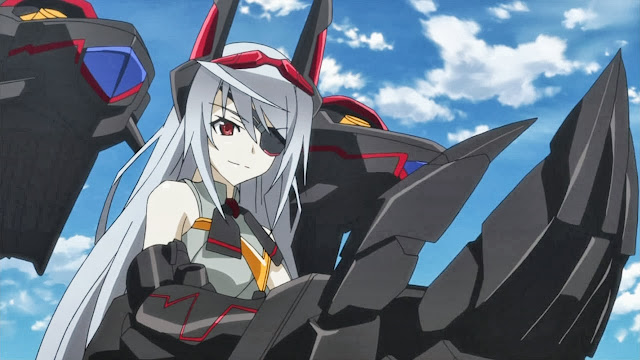
- Laura’s characterisation progressed from being a cold super-soldier to someone who is infaturated with Ichika within the space of two episodes: after effortlessly thrashing Rin and Cecelia and putting up a reasonable fight against Ichika and Charlotte, her unit goes berserk until Ichika manages to free her.

- Apparently, Laura’s entire knowledge of Japan comes from her deputy commander, Clarissa Harfouch, whose experience is limited to anime and otaku culture, serving as a reminder to anime fans that Japan doesn’t come close to resembling what is found in anime, and that it would be quite mistaken to believe that anime reflects present day Japanese culture. This reason is why continue to maintain that anime generally does not reflect on contemporary Japanese culture and thus, has next to no academic value.

- The fact that anime is entertainment is something that one Elineas at Nihon Review fails to understand: he cites the series as “a marriage of typicality and inconsistency” with characters that are “premade constructions thrown into a world that simply doesn’t make sense”. Half of the Nihon Review staff seem to be under the delusion that anime should be as meaningful as Fyodor Dostoyevsky’s Crime and Punishment or other literary classics, and write with a pretentious manner wherever they encounter a series that doesn’t suit their liking

- Cecelia and Rin watch with yandere-like eyes as Ichika takes Charlotte swimsuit shopping. I read much of the Nihon Review’s contents with similar disdain: while Infinite Stratos may not be as engaging as something like Gundam Unicorn, it certainly isn’t horrible, either. The same can’t be said for Elineas’ “review”, which sadly, reflects his incapacity to write a coherent passage without the compulsion to use Microsoft Word’s built-in thesaurus every five words.

- Houki later recieves the Akatsubaki, one of only two developed 4th generation IS and a short-range melee-class IS, armed with twin katanas and the One-Off ability that allows Houki to replenish both her own and other IS’s energy when she comes in contact with them.
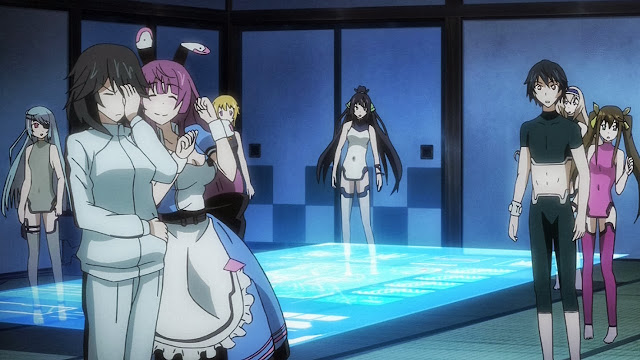
- Chifuyu reacts to the antics of Tabane Shinonono, Houki’s older sister and the creator of the IS: despite her intellect and age, she is eccentric and acts childishly. Her presence seems to evoke an unusual sense in me, reminding me strangely of Chobits, despite my never having seen the anime properly before.

- Aside from the inter-school battles, the only major battle takes place between the individuals with personal IS and an unmanned IS known as the “Silver Gospel”: fielding next-generation hardware, it puts up an impressive fight.

- Instead of flanking their opponents and capitalising on their weapons capabilities to engage targets at long range and use covering fire to close distance for melee, the IS operators seem to prefer charging right in towards an opponent. Some, like Charlotte, are capable of quick thinking and perform well in teams, so the lack of strats isn’t common to all of the IS operators per se.

- IS is a difficult anime to gauge accurately: on one hand, the comedy and inter-character interactions are immensely satisfying to behold, as are some of the combat sequences. On the other hand, the IS themselves and their origins could have used more exposition and development. This is the hazard of the 12-episode anime approach, as everything needs to be condensed into a shorter time period.

- The fact that a second season was announced will hopefully extend the story-side of things; 24 episodes of failing romance would probably be tiring to watch, even if it were interspersed with combat sequences and free anatomy lessons.
Shine is something that Infinite Stratos does succeed in, despite lacking any sort of real story tied to the IS themselves (the backstory and flashbacks don’t really contribute heavily). The superficial premise in Infinite Stratos means that there is no story to speak of: there are no politics, warfare, secret conspiracies or hidden treasure hunts. Where it lacks substance, it compensates for in style, featuring visually appealing combat sequences, and character interactions set appropriately for the setting. All of the archetypes are present, but the outlandish setting allows each of the girls’ personalities to play off one another. This is especially apparent in Cecilia Alcott and Huang Lingyin’s open competition for Ichika’s heart), as well as the age-old “guy is actually a girl” device. While contributing nothing to the way things play out in the long run, the girls’ interactions nonetheless add a substantial amount of comedy to the series. As a romance comedy with science fiction elements, Infinite Stratos manages to keep things entertaining: as for the recommended audience, I think that this series is suited for those seeking a wild romance comedy with mecha-like implements and don’t mind the lack of development towards story side things. In other words, this is an anime for open minded viewers who seek something simple-minded, free of morals and social implications.



























